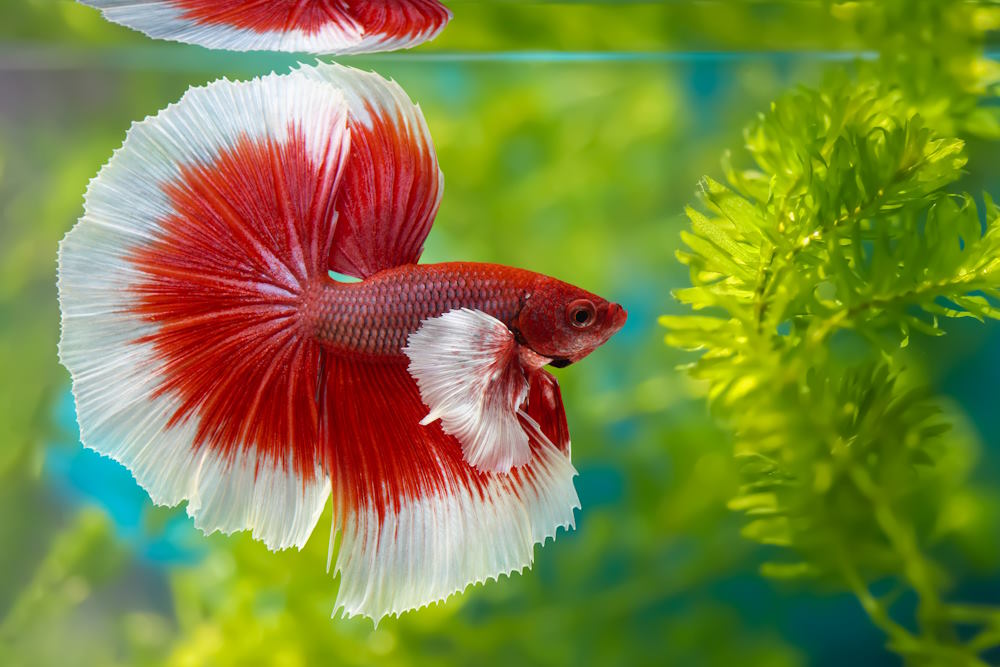The Ultimate Overview to Betta Fish Treatment: Necessary Tips for Maintaining a Healthy And Balanced and Thriving Aquarium Setting
Efficient Betta fish care demands a thorough understanding of their special environmental and physical needs. Developing a suitable fish tank starts with picking the right storage tank size and making sure optimal water problems, which are vital for the health and health of your Betta.
Choosing the Right Container
Selecting the suitable container for your Betta fish is important to guaranteeing its wellness and wellness. Bettas prosper in atmospheres that imitate their natural habitats, which typically consist of calmness, cozy waters. A container dimension of at the very least five gallons is suggested to supply ample swimming area, as smaller tanks can bring about stress and health and wellness problems for these dynamic fish.
When picking a tank, think about the storage tank's form and purification system. A rectangular tank is more suitable to a dish, as it uses a lot more area for oxygen exchange. Additionally, a trustworthy filtering system is important to preserve water top quality and reduce the frequency of water adjustments (betta fish). Nonetheless, it is very important to choose a filter with a gentle flow, as Bettas are not solid swimmers and may battle versus strong currents.
Temperature policy is another essential element; Bettas like water temperatures in between 76 ° F and 82 ° F. Buying a great heater will certainly make certain that the water stays within this range, advertising a healthy and active way of living for your Betta. Giving ideal container decorations and hiding places will assist minimize tension and urge natural actions, additionally boosting your Betta's wellness.
Preserving Water Top Quality
Preserving optimum water high quality is vital for the wellness and longevity of Betta fish. This calls for routine surveillance of numerous parameters, consisting of temperature level, pH, ammonia, nitrite, and nitrate degrees. Bettas flourish in temperature levels between 76 ° F and 82 ° F, so preserving a steady temperature level is important. Sudden changes can bring about stress and health problem.
Regular testing using a reputable water screening set can aid make certain these criteria continue to be within the ideal varieties. Ammonia and nitrite degrees need to constantly be at 0 ppm, as also low concentrations can be toxic to Betta fish.
Routine water changes are crucial to preserving water quality. In addition, integrating a durable filtering system can help in preserving water clarity and quality, offering a much healthier habitat for your Betta fish.
Perfect Feeding Practices
Offering a balanced diet regimen is critical for the health and vibrant pigmentation of Betta fish, as their dietary requirements play a considerable function in their total health. Betta fish are meat-eating by nature, requiring a diet regimen high in protein. A mix of high-quality pellets, icy additional reading or live foods such as bloodworms, brine shrimp, and daphnia can give the vital nutrients they need.
Feed your Betta fish two to three times a day, supplying only what they can take in within 2 to 3 mins to protect against overfeeding and maintain water high quality. Overfeeding can bring about obesity and health and wellness problems, consisting of swim bladder disease. It is important to check their nutritional consumption and adjust part dimensions as necessary.
In addition to protein, a balanced diet regimen should include minerals and vitamins to advertise optimum wellness. Consider supplementing their diet plan with top notch flakes or pellets especially formulated for Betta fish, as these frequently include needed ingredients.

Producing a Suitable Habitat

Water top quality is critical; keep a temperature level between 76 ° F and 82 ° F, and guarantee the pH level varies from 6 - betta fish.5 to 7.5. Regular water adjustments of 25-50% per week will assist keep contaminants away and make certain a secure atmosphere
Including plants and hiding spots is vital, as Betta fish are normally territorial and enjoy having locations to check out and pull back. Live or silk plants, along with caves and accessories, can produce a revitalizing setting.

Regular Wellness Checkups
Carrying out normal health appointments is important for ensuring the wellness of Betta fish, as very early detection of possible problems can avoid serious health and wellness problems. These appointments should include a comprehensive evaluation of the fish's physical condition, habits, and ecological elements.
Begin by observing the Betta fish for any kind of signs of distress, such as lethargy, loss of hunger, or unusual swimming patterns. Additionally, examine the fins and body for indicators of staining, lesions, or fin rot, which can suggest infections or parasites. Frequently keeping an eye on the water top quality in the fish tank is similarly crucial; criteria such as pH, ammonia, nitrite, and nitrate levels must be kept within optimum ranges to avoid anxiety and health problem.
Furthermore, consider keeping a log of wellness observations and water high quality examinations. This record can help with the identification of patterns or persisting concerns. If any type of problems are spotted during the examination, it is necessary to get in touch with a veterinarian experienced in marine animals. Timely intervention can make a considerable difference in the recovery of your Betta fish, guaranteeing a long and healthy life in a well-maintained aquarium environment.
Conclusion
In verdict, successful Betta fish treatment hinges on creating and preserving an optimal aquarium setting. By complying with these guidelines, aquarists can advertise the well-being and vibrancy of Betta fish, eventually resulting in a thriving water ecosystem.